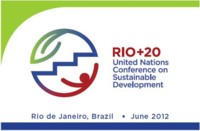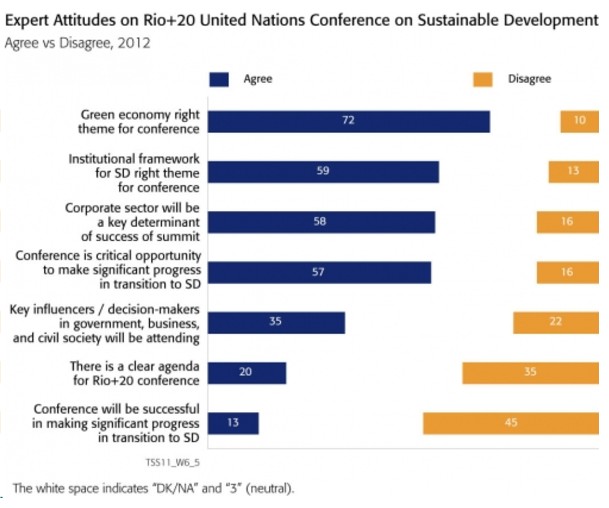Forty Days and Forty Nights - The Countdown to Rio
 “We are at a crucial stage with respect to the United Nations Sustainable Development Conference (Rio+20) next month and countries must make better progress in negotiations on the outcome document to be endorsed at the conference.” This was the message given last week by UN Secretary-General Ban Ki-moon to members of the UN General Assembly.
“We are at a crucial stage with respect to the United Nations Sustainable Development Conference (Rio+20) next month and countries must make better progress in negotiations on the outcome document to be endorsed at the conference.” This was the message given last week by UN Secretary-General Ban Ki-moon to members of the UN General Assembly. “We have about 40 days - and 40 nights - to Rio. We must use every moment,” he said calling for all countries to show flexibility to reach agreement on substantive issues ahead of the conference scheduled for June 20-22.
“Quite simply, we need a negotiated outcome document before Rio to ensure the high-level participation that we have worked so hard to generate,” he added.
His call for unity of purpose and progress in negotiations comes at a time when expectations of success at Rio are at an all time low. A recent poll of sustainable development experts by GlobeScan/SustainAbility, showed a majority of those surveyed (57%) saw the Rio+20 Summit as a critical opportunity for progress on sustainability leadership, but few (13%) thought it will succeed.
The 642 experts from business, NGOs, academia and government in 77 countries agreed the green economy and a new institutional framework for sustainable development were the right themes for the summit, but few believed significant progress would be made in the transition to sustainable development.

What’s at Stake?
At the end of 2012 the first commitment period for the Kyoto Protocol will expire, and despite some progress in forging a consensus of sorts on the need for action, global greenhouse gas emissions are still at an unacceptably high level. The climate change challenge is as great today as ever according to many climate experts, and world governments still cannot agree on what to do about it.
Mr. Ban emphasized that deliberations over the next few weeks will shape actions on the main issues to be addressed in Rio, such as management and protection of oceans, universal access to sustainable energy and water, and improving life in the world’s cities.
Others believe that a more fundamental issue is at stake, namely the absence of a global governance regime and the failure to set out a viable roadmap to guide actions by the business community.
“Governments are going to have to make the tough decisions to change the policies and the budgets that are now underwriting unsustainable forms of development,” says Jim MacNeill, secretary general at the Brundtland Commission.
“They’re going to have to develop a whole new framework of incentives that support and encourage those business leaders that want to move in more sustainable directions,” he added.
Unless we can manage to move the public, the media, and the businesses to see that we are interdependent and that we need to make choices together, politicians in single nations have difficulty even if they are good leaders, noted Gro Harlem Brundtland, chair of the Brundtland Commission.
While a collaborative approach will be important, a shift in governance on both a national and international level will be crucial, she notes. For business to take the next step towards a green economy, governments need to put in place regulatory frameworks and systems that promote sustainable development and give companies the confidence to make long-term decisions.
UN Secretary-General Ban also stressed the need for agreement on Sustainable Development Goals that build on current anti-poverty and social development targets that have a deadline of 2015.
“We must harness the power of partnership to shift the world onto a more sustainable trajectory of growth and development. Rio should be a concrete step forward in this regard,” he said.
Ban’s comments and those of other key principals reflect a subtle but not insignificant shift in emphasis on the purpose of the Rio+20 gathering, which is no longer directly addressing climate change, focusing instead on other sustainable development priorities, including doubling the share of renewable energy as one of a series of ‘Sustainable Development Goals’.
Sustainable development talks at next month’s Rio+20 summit are set to be “very helpful” for the UN climate change negotiations, said Christiana Figueres, executive secretary of the UN Framework Convention on Climate Change (UNFCCC) speaking to reporters this week as the latest round of climate talks began in Bonn, Germany.
“From our perspective, what is clearly a very important outcome in Rio is the understanding of the very, very clear link that exists between the pursuance of sustainable development and addressing climate change,” she said. “Both of those things obviously go hand-in-hand, and so conversations like those in Rio that actually aim at an aspirational picture of what kind of society we want to construct are actually very helpful to this convention.”
Based on the timetable agreed to in Durban for a global accord on climate change by 2015, the Rio+20 discussions most likely will simply be one of several international dialogues that will take place over the next three years leading to an agreement to put in place a regulatory regime that in time will seek to limit greenhouse gas emissions.
What is clear about the Rio+20 talks is the fact that the world has changed considerably since 1992, year when the UN Conference was last held in Rio and when the agreement on the Climate Change Convention (which in turn led to the Kyoto Protocol) was signed.
Speaking at a conference in Copenhagen last month organized by the ethical investment research group EIRIS, Jacqueline McGlade, Executive Director of the European Environment Agency, noted that in the past 20 years the telecommunications and internet revolutions, the financial crisis, and the rise of the developing world have radically altered the foundations of policymaking that existed in 1992.
“Is the idea of sustainable development still relevant in a world where western countries lack money to invest”, she asked? “Is it relevant in a world where billions of people seek to enjoy the comfort of middle class lifestyles, which so often involve unsustainable consumption?”
“The answer is yes,” she says. Sustainable development is more relevant now than ever. In 1992 policy-makers were only starting to link environmental problems with development issues. But we now have ample evidence of just how interlinked these issues are and have a growing awareness of our dependency on a dwindling stock of natural resources, she noted.
In her view, Rio+20 is the ideal starting point for launching the global ‘Green Economy’ - linking sustainable development to:
•Maximizing resource efficiency, by reducing our use of water, fossil fuels, and mined materials as much as possible;
•Ensuring greater ‘resiliency’ of our ecosystems and the services they provide; and
•Providing jobs and opportunities for the world’s growing population and meeting their expectations of improved standards of living.
By 2050 not only will the world’s population grow to 9 billion people (up from 7 billion today), there will be 3 billion extra middle class consumers seeking to raise their living standards, which will put additional strains on the planet’s already over-stressed resources.
Rio+20 could provide an opportunity for the world’s policy-makers to adopt a green economy roadmap for sustainable development for the next 20 years and beyond, as well as specific goals and timetables for the policy actions these goals will require.
This is very much the perspective of Achim Steiner, UN undersecretary-general and executive director of the UN Environment Programme. “Following four decades of UNEP initiatives on the environment and the green economy, attention turns to the Rio+20 summit where the idea of a true green economy could gain flesh and bones,” says Steiner.
Rio+20 may prove to be the opportunity for the green economy initiative to be translated into a fresh and forward-looking way of finally realizing true sustainable development, he added.
Long-term sustainability objectives such as proposed by UNEP have moved up the policy agenda in recent years and are filtering into traditional ways of doing business. But the challenge remains, however for business and finance leaders, policy-makers, and regulators to find effective ways work together towards a new more sustainable economic development model.
This issue was addressed recently at GLOBE 2012 in a special session on Sustained Growth and Sustainability: Re-engineering the Economic Model chaired by Paul Clements-Hunt, former head of the UNEP-FI initiative.
The Rio+20 conference may not achieve the breakthrough in climate management that many once saw as crucial in the wake of the demise of the Kyoto Protocol; but setting the global economy on a green, inclusive and more sustainable footing may in the long run be a more fitting legacy.
You can return to the main Market News page, or press the Back button on your browser.

